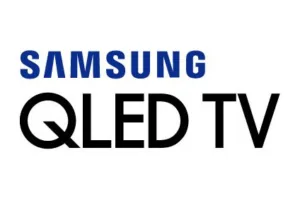Nobody at Samsung will quite say they are at war with OLED-TV, but it’s not hard to read between the lines.

- Since its final, grudging flirtation with OLED-TV a couple of years ago, Samsung has said consistently it will by-pass OLED-TV and go directly to what has been called, until recently, QLED (electro-emissive quantum dots).
- Last year, Samsung acquired the QD assets of QD Vision, primarily for its electro-emissive QD technology and the QLED brand. I haven’t heard about any particular activity at Samsung in QD Vision’s quantum-dot-on-LED-chip (dot-on-chip) technology, but I would be surprised if there weren’t a group at Samsung Display working on this as a possible next-generation replacement for the the RG-phosphor-on-LED technology currently used in the MU series TV sets.
- Samsung has spent a lot of money and effort on redefining the QLED brand to mean “any display utilizing quantum dots.” The brand was introduced with great fanfare at CES 2017, as was the Q brand to designate Samsung’s top-of-the-line TVs and their enhanced characterists.
- Samsung has offered the QLED designation for use by any maker of quantum-dot-enhanced displays without charge!
How does this make sense? Only if Samsung wishes to establish QLED as a product category rather than a proprietary brand. And this only makes sense if the intention is to enlist as many QLED allies as possible in a QLED vs. OLED war, with the goal of marginalizing OLED-TV until electro-emissive QD is ready to be rolled out in volume — which will probably take from five to ten years.
Not an Improbable Goal
This goal is not improbable. Jennifer Colegrove of Touch Display Research projects that OLED-TV’s overall market share in 2021 will be under 6%. In 2027, she projects sales of 210 million QD TV sets and 40 million OLED-TVs. That’s a bit less that 20% of the QD-TV-plus- OLED-TV market, and it doesn’t consider any possible effects of Samsung’s battle plan.
I have seen no evidence of Samsung being concerned about sharing the, presumably valuable, QLED brand with its competitors. If QLED-TV keeps OLED-TV at bay Samsung, as the largest TV manufacturer, will benefit and can well afford to share a small amount of the wealth. A rising tide lifts all boats, and the biggest boat lifts the most tonnage.
A 2017 Samsung Q-series QLED TV. The top-of-the-line Model Q9 has peak white luminance of approximately 2500 cd/m² and a black level of approximately 0.02 cd/m². (Photo: Samsung)
Many industry-watchers think electro-emissive QD technology promises to be the ultimate display technology, but nobody thinks it’s easy. What if commercialization takes more than 10 years? What if it just turns out to be too difficult or too expensive for financial viability? Will Samsung’s QLED-vs-OLED battle plan still make sense then? I’d say yes.
Until recently, LG has legitimately presented OLED as the TV display technology of choice. The problem is that OLED-TV technology has not improved dramatically for several years and QD-enhanced LCD-TV technology has. Looking at an LG Signature OLED side-by-side with a Samsung Q9 QLED TV is eye-opening. The Q9 has a peak white luminance approximately three times that of the OLED (2500 cd/m² vs 800 cd/m²), and at about 0.02 cd/m² the LCD’s black state is just noticeably different from the OLED’s, but you have to look pretty hard.
The decision depends on taste to some extent, but I don’t think many dispassionate observers would say that the OLED is clearly better than the QLED, and many would say the opposite. So the QLED-vs-OLED battle plan can make plenty of sense, even if electro-emissive QLED never become viable.
And there are next-generation LCD-TV technologies being developed that do not depend of electro-emissive QDs. With dot-on-chip and quantum-dot replacements for the matrix color filter, we can look forward to significant improvements in LCD-TVs in the mid-level, premium, and super-premium categories. The battle plan is viable.
Although OLED development has been focused more on manufacturing yield and efficiency than on major image improvement, that doesn’t mean work will not accelerate in the near future. But OLED’s future depends on material and process development, both of which are necessarily painstaking endeavors.
Ken Werner is Principal of Nutmeg Consultants, specializing in the display industry, manufacturing, technology, and applications, including mobile devices and television. He consults for attorneys, investment analysts, and companies re-positioning themselves within the display industry or using displays in their products. He is the 2017 recipient of the Society for Information Display’s Lewis and Beatrice Winner Award. You can reach him at [email protected].

